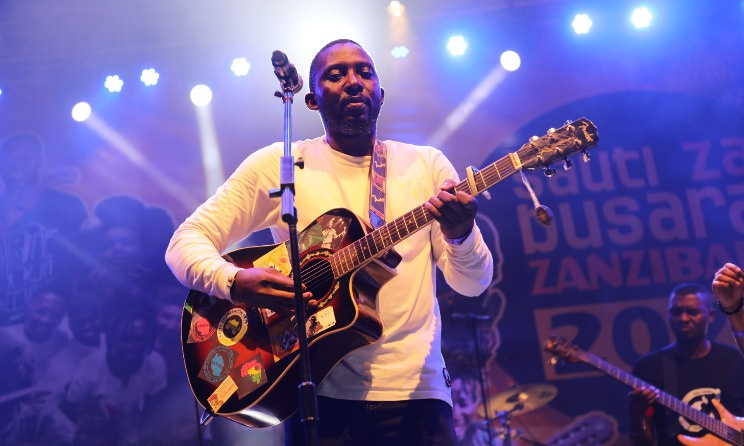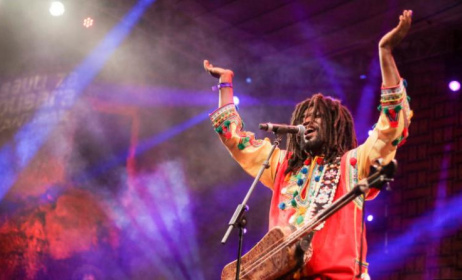Sauti za Busara 2021: Organisers pull off successful fest amid challenging times
By Paul Albert
East Africa’s favourite festival Sauti za Busara (SzB) was held at the historic Old Fort in Stonetown, Zanzibar, on 12 and 13 February. It brought together artists from South Africa, Algeria, Uganda and Tanzania for a weekend of eclectic performances under the theme, Alive & Kickin.
 Vitali Maembe was a crowd favorite at Sauti za Busara 2021. Photo: Festo Polea
Vitali Maembe was a crowd favorite at Sauti za Busara 2021. Photo: Festo Polea
Opening day, Friday, saw hundreds of music lovers of various ages and nationalities line up at the venue entrance eager to experience African live music at its best. For the first time, the festival organisers were faced with last-minute cancellations from many foreign artists, including Yugen Blakrok (South Africa), Milton Gulli (Mozambique), Dawda Jobarteh (the Gambia), Dogo Fara (Reunion) and Sika Kokoo (Ghana). While some of these acts were unable to travel due to COVID-19 restrictions on international travel, others could not secure travel grants.
Performances
This edition programmed a reduced number of performances from 40 to 14 acts spread over two days instead of the usual four. A large portion of the line-up consisted of Tanzanian musicians.
Some highlights were Vitali Maembe, Msafiri Zawose , TaraJazz and Stone Town Rockers. These artists are recognised as the leading figures across various genres in the country. Maembe was exhilarated to be on the line-up, considering that he had been applying to play at Sauti za Busara for more than a decade but never made it through. “I also applied last year, but my application was rejected,” he said. “It was a huge relief when I received a last-minute call to play at the festival. There was no way I was going to turn it down. It is a once-in-a-lifetime opportunity.”
There were brilliant performances from emerging artists such as Tofa Boy, Siti Muharam and Richie Lumambo, who, despite being in their early music careers, gave a rousing performances. Singer Dulla Makabila was the closing act. His performance was like a shot of adrenaline. He left the audience on a genuinely explosive high proving that singeli music is a crowd favourite.
For musicians like Sandra Nankoma (Uganda) and Djam (Algeria), last weekend's performance was their first time on a big stage almost a year since the COVID-19 outbreak.
Attendance with precaution
The pre-event organisation was viewed with pessimism in many circles, with some activists and sponsors calling for its cancellation while others expressed doubts about whether people would show up. On the contrary, official figures showed that more than 5 000 people were in attendance.
Precautionary measures to prevent the spread of COVID-19 were in place including temperature checks for everyone entering the venue, sanitiser dispensers, hand-washing stations and regular announcements for awareness and preparedness. “We took precautions as per pandemic guidelines the Ministry of Health had given us,” festival manager Journey Ramadhan said.
The more than 3 000 foreigners in attendance applauded the organisers’ efforts in maintaining the ministry’s guidelines, emphasising that the event brought renewed hope for artists and businesses. Ali Juma, a local trader inside the Old Fort, said that before life could regain a semblance of normality, the public had to learn how to live with COVID-19. “We must learn how to live with it by taking the necessary precautions as addressed by our health experts. Communities have to survive because no one is going to bring food to your doorstep,” he said.
While local entrepreneurs applauded the turnout, festival director Yusuf Mahmoud said there had been times of uncertainty. “There were many times over the past year when I feared whether it would be possible for the 2021 edition to go ahead,” he said. “We chose the theme Alive & Kickin in solidarity with Tanzanians, to offer hope and solutions, showing that even in the context of a global pandemic we have to adapt and find new ways to survive and stay alive. It was a heavy responsibility and I am thankful to the many Tanzanians and partners who stood with us 100% all the way”.
What we missed
Over the years, the festival has been accustomed to hosting fringe activities alongside the main event, such as the Movers and Shakers networking session, a carnival parade, and Swahili Encounters – a collaborative project between local and foreign artists. These events were cancelled due to a shortage of funding, as most partners could not offer support after a year of little or no business activities.
“When the blanket is short you learn to fold your legs, so we had to cancel these activities including other stages at the Forodhani Gardens and the Old Fort Amphitheatre,” Mahmoud said.
When the festivalgoers were leaving the Old Fort, they were already looking forward to the next edition, set to take place over Valentine’s Day weekend next year.



























Commentaires
s'identifier or register to post comments